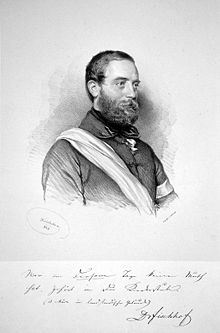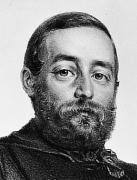Adolf Fischhof

Adolf Ephraim Fischhof (born December 8, 1816 in Ofen ( Budapest ), † March 23, 1893 in Emmersdorf , today part of Klagenfurt ) was an Austrian doctor and liberal politician.
Life
Adolf Fischhof, the son of little wealthy Jewish parents, attended grammar school in Pest , where he sat on the “Judenbank” with fellow believers, and studied medicine in Vienna from 1836 to 1844. As a young doctor he took part in the March Revolution . His speech on freedom of the press in the courtyard of the Niederösterreichisches Landhauses in the Herrengasse in Vienna on March 13th is considered the impetus for the Viennese March Revolution in 1848. He not only represented the liberal demands of the revolution, but also turned to the decisive topic of his political activity at this point: the balance between the nationalities of the Habsburg multi-ethnic state. In March 1848 he was elected commandant by the medical corps of the Academic Legion, the organized revolutionary student body, and was a member of the Central Political Committee and President of the Security Committee. Later he represented the Viennese district Matzleinsdorf in the constituent Reichstag. In this assembly and in its constitutional committee he played a prominent role. He was instrumental in drafting the draft constitution of April 25, 1848.
Fischhof was appointed to the Ministry of the Interior by the liberal ministry Anton von Doblhoff-Dier . He held this post until October 1848. When the Reichstag in Kremsier was dissolved on March 7, 1849, Fischhof was arrested and charged with rebellion and high treason, but acquitted after almost nine months of pre-trial detention for lack of evidence.
Fischhof then turned to medical practice. After the political landscape had become more liberal again, in March 1861, together with the later Minister Joseph Unger, he published the pamphlet on the solution of Hungarian questions , in which dualism was advocated, and after the German War of 1866 the one that was patriotic and fought against discouragement Brochure A look at Austria's situation . At the end of 1869 he published Austria and the guarantees of its holdings , in which he recommended a federal state structure. In his various memoranda, he proposed a system of “curia”, each of which should take care of the cultural and linguistic affairs of the individual nations, as well as national arbitration tribunals and legislation that gave the different languages equal rights, albeit with German as the state language , should treat. He also campaigned for universal and equal suffrage.
As early as 1867, Fischhof had received all civil rights back through an amnesty, his wise judgment was highly valued, leading statesmen sought advice from him, but in 1870 he refused a ministerial post under Alfred Józef Potocki , “if only because he would have been at this price To renounce Judaism ”.
For health reasons he finally gave up his political and medical work and retired in 1875 with his brother Simon to a modest country house, the Koglhof, in Emmersdorf near Klagenfurt, where he cared for the villagers free of charge, “a friend and advisor to everyone those who sought help from him, the famous doctor and noble person. He never took a Heller for his medical assistance, rather he appeared in the poor peasant's hut with refreshment and words of comfort for the patient, “as the rabbi and Reichsrat member Joseph Samuel Bloch reports in his memoirs.
Three years later there were talks between Rieger and Michael Etienne , the co-founder and publisher of the Neue Freie Presse , here in the house of the “sage of Emmersdorf” and in his presence expressly stipulated by František Ladislav (Franz Ladislaus) Rieger as the representative of the Czech liberals , as a prominent representative of the German liberals, deliberations which Alexander Scharf , the founder and editor of the Wiener Sonn- und Mondagszeitung, also attended. After the Austro-Hungarian settlement of 1867, the "Emmersdorfer Memorandum", which emerged from these consultations, now aimed at a settlement between Germans and Czechs in the monarchy and drew the guidelines for one without going into details and legal subtleties future policy of reconciliation, but remained unsuccessful because of the completely centralist German liberal MPs, whom Etienne was unable to win over to a policy of national accommodation.
After this disappointment, Fischhof did not enter the political arena again until 1882 when he tried to found a German people's party together with Robert von Walterskirchen , which was to take a position more willing to compromise than the centralist German liberals on the question of nationality and to establish a coalition of all liberal elements. His speech on this in the Vienna Musikvereinssaal was printed in the Klagenfurter Zeitung from July 21 to 23, 1882. However, the formation of a party failed due to resistance from the constitutional party , whereupon Fischhof finally withdrew from politics. When he died eleven years later, "all the church bells in Emmersdorf rang", and after he was laid out in the Israelite prayer house in Klagenfurt, a large number of mourners accompanied his coffin to Klagenfurt Central Station, because at his request, Fischhof was buried in Vienna's central cemetery. His grave is at Gate 1, Group 5b, Row 1, No. 3. The tombstone bears the most significant sentence from his great revolutionary speech in Vienna's Herrengasse, including the date:
“Up to now, ill-advised statecraft has kept the peoples of Austria apart;
they must now come together fraternally and increase their powers through union.
March 13, 1848 "
In 1979 the Fischhofgasse in Vienna- Favoriten (10th district) was named after him, in Klagenfurt-Emmersdorf the Dr.-Fischhof-Straße has been named after him since 1992.
Fonts
- A look at Austria's location. Letter to the editorial team of "Telegraf" , Wallishausser, Vienna 1866, (Google eBook) ; New edition: Kessinger Publishing, LLC, 2010 ISBN 1-168-31047-4
- Austria and the guarantees of its holdings , Wallishausser (Josef Klemm), Vienna 1869 Google books
- The Austrian language dispute. A word addressed to his fellow citizens on the occasion of this year's historical memorial days , Manz, Vienna 1888 ( Google books: Passagen )
literature
- Josef Samuel Bloch: Adolf Fischhof , in memories from my life , Volume 1, Löwit Verlag, Vienna-Leipzig 1922, English: My reminiscences , Ayer Publishing, Manchester, New Hampshire, 1973, ISBN 0-405-05254-5 . Pp. 56–80 Google books, English .
- Werner J. Cahnman: Adolf Fischhof and his Jewish Followers . Leo Baeck Institute Yearbook, London 1959, 4 (1), pp. 111-140.
- Richard Charmatz: Adolf Fischhof - The life picture of an Austrian politician , Klett-Cotta, Stuttgart 1910, ISBN 3-85823-348-X .
- Michael Graetz: Adolf Fischhof - a Jewish academic at the forefront of the revolution of 1848 , pp. 296–308. In: Armin Kohnle / Frank Engehausen: Between Science and Politics. Studies on German university history . Festschrift for Eike Wolgast on his 65th birthday, Stuttgart 2001, ISBN 3-515-07546-1 .
- Robert A. Kann: Fischhof, Adolf. In: New German Biography (NDB). Volume 5, Duncker & Humblot, Berlin 1961, ISBN 3-428-00186-9 , p. 214 f. ( Digitized version ).
- I. Reifowitz: Threads Intertwined: German National Egoism and Liberalism in Adolf Fischhof's Vision for In: Nationalities Papers, Volume 29,3 pp. 441–458, Routledge, London-New York 2001.
- Constantin von Wurzbach : Fischhof, Adolph . In: Biographisches Lexikon des Kaiserthums Oesterreich . 4th part. Typogr.-literar.-artist publishing house. Establishment (L. C. Zamarski, C. Dittmarsch & Comp.), Vienna 1858, p. 253 f. ( Digitized version ).
- Fischhof Adolf. In: Austrian Biographical Lexicon 1815–1950 (ÖBL). Volume 1, Verlag der Österreichischen Akademie der Wissenschaften, Vienna 1957, p. 325.
Web links
- Entry on Adolf Fischhof in the Austria Forum (in the AEIOU Austria Lexicon )
- Fischhof writings dig.
- Gerhard-Hermann Kuhlmann: Small glossary on the revolution of 1848: Adolf Fischhof
- Max Grunwald, History of Viennese Judaism until 1914
Individual evidence
- ^ Gerhard-Hermann Kuhlmann: Small glossary on the revolution of 1848: Adolf Fischhof
- ^ Stanley L. Paulson, Martin Schulte: Georg Jellinek: Contributions to life and work . In: Contributions to the legal history of the 20th century . tape 27 . Mohr Siebeck, 2000, ISBN 3-16-147377-9 , ISSN 0934-0955 , p. 58 ( books.google.de [accessed December 22, 2016]).
- ↑ a b c Max Grunwald, History of Viennese Judaism up to 1914, which tells the school youth . Self-published by the Israelitische Kultusgemeinde, Vienna 1926, p. 48f.
- ^ Josef Samuel Bloch: My Reminiscences , (1922), Reprint : Ayer Publ., 1973, p. 55
- ^ [Richard Charmatz: Adolf Fischhof - The life picture of an Austrian politician . Klett-Cotta, Stuttgart 1910, p. 19ff.]
- ↑ a b Josef Samuel Bloch: Memories from my life . Volume 1, R. Löwit, Vienna-Leipzig 1922, p. 58
- ↑ Charmatz, Adolf Fischhof: the life picture of an Austrian politician , Cotta, Stuttgart 1910, p. 298, p. 325
- ↑ Charmatz, Adolf Fischhof, Lebensbild , p. 325ff.
- ^ A b Dieter Jandl, " The sage of Emmersdorf " (part 2), in Kleine Zeitung , Klagenfurt, v. September 17, 2011, p. 28
- ↑ Charmatz, Adolf Fischhof. Life picture , p. 327
- ^ Hedwig Abraham: Art and Culture in Vienna. The Vienna Central Cemetery
| personal data | |
|---|---|
| SURNAME | Fischhof, Adolf |
| ALTERNATIVE NAMES | Fischhof, Adolf Ephraim (full name) |
| BRIEF DESCRIPTION | Austrian politician |
| DATE OF BIRTH | December 8, 1816 |
| PLACE OF BIRTH | oven |
| DATE OF DEATH | March 23, 1893 |
| Place of death | Emmersdorf (Klagenfurt) |

